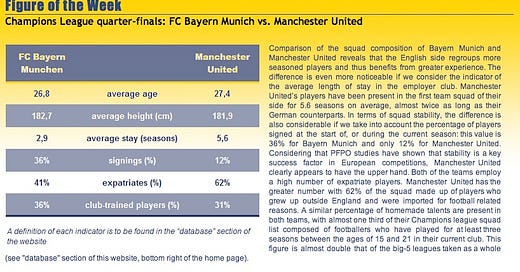United up against Bayern: older, shorter, almost twice as long-serving - and thus favourites to win
By Nick Harris
29 March 2010
When Manchester United take on Bayern Munich in the first leg of their quarter-final in the Champions League in Germany on Tuesday night, they’ll do so with a squad that’s slightly older, slightly shorter and almost twice as loyal when measured by how long their players have stayed with them.
They’ll also have far fewer new faces than Bayern, compared to last season, although more expatriates, and slightly fewer club-trained players.
We know all this information because our friends over at The Professional Football Players Observatory (PFPO) in Neuchâtel, Switzerland, are going to publish regular comparisons of opposing squads in Champions League games between now and the end of the 2009-10 competition. The first comparison, online now at their website, which is highly recommended, features Bayern-United.
As the PFPO tells us: “On the basis of the aforementioned criteria, we also indicate the team that is most likely to qualify.”
And the verdict is . . . United.
The PFPO is a fascinating resource for information about which players play where in Europe’s top five leagues. It keeps track of ages and nationalities, training progression, migrations across time, and an assortment of other facts.
Below we reproduce, with kind permission, the table comparing Bayern and United by key indicators. It’s self-evident, but the main points are:
United’s squad is slightly older, on average; almost 1cm shorter per man (which might give them an advantage with the ref, according to this); and the key thing is that United’s players have been at the club on average 5.6 seasons each, against the Bayern players’ 2.9 seasons each with their own club.
As the PFPO analysis says: “In terms of squad stability, the difference is also considerable if we take into account the percentage of players signed at the start of, or during the current season: this value is 36 per cent for Bayern Munich and only 12 per cent for Manchester United. Considering that PFPO studies have shown that stability is a key success factor in European competitions, Manchester United clearly appears to have the upper hand.”
Both teams have a lot of expatriate players; Bayern 41 per cent and United 62 per cent. That United figure these days runs contrary to their tradition (certainly compared to Arsenal or Chelsea or Liverpool, say) of rearing more of their own talent during the Premier League era.
Both United and Bayern have raised a similar amount of club-trained players - Bayern at 36 per cent and United at 31 per cent. “This figure is almost double that of the big-five leagues taken as a whole,” the PFPO says.
.

.
Sportingintelligence’s home page



